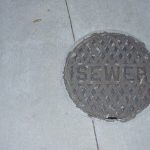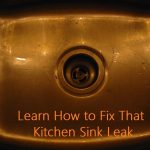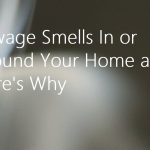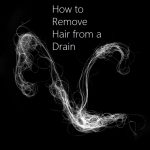We rely on our home plumbing systems to work without any water issues, and we’re always surprised when a leak occurs. The network of plumbing pipes carry water throughout our homes, and they can cause leaks under the right circumstances. In this article, we will look at seven of the most common water leak causes and explain why they occur.
- Frozen Pipes
This is probably the water leak cause that many people will be familiar with from their own experiences. When the plumbing pipes freeze, and they are not thawed quickly, they can be more prone to bursting. This happens because the water freezes to create ice that then expands inside the pipe, placing the internal surfaces under pressure. This causes damage to the pipe, which is noticed when the ice thaws and the pipe cracks or bursts as the pressure is released. If you have a frozen pipe, you can use a blow dryer or a portable heater to warm the pipe up and get rid of the ice. It’s also a great idea to install insulation on your plumbing pipes to protect them against freezing temperatures.
- Poor Home Construction and Plumbing Installations
When a home is built, the soil under the property must be compacted to make the surface safe. If this isn’t done correctly, the soil could be prone to settling, and this can unsettle the foundations of your home even more. This is happening on a level that’s not likely to be detected by your normal senses, but it is bad news for your home plumbing. These small movements can cause your pipes to move in unexpected ways, and this can lead to cracks or breaks. This could cause very small water leaks that would get gradually worse over time until it becomes very noticeable. An improper installation of any plumbing such as a fixture or a system can lead to loose connections that are prone to leaking. If you’re building a new home or installing a new plumbing system, it’s imperative that you use properly licensed contractors and plumbers to avoid these serious problems.
- Exterior Root Intrusion
The pipes that connect your home to the public water supply and the waste system are located underground. This would seem like a safe location, but there are a few problems related to ground movement, and, more often, the intrusion is from tree roots. If a plumbing pipe or a drain line has cracked slightly, it will release small volumes of water into the surrounding ground. A tree root can detect this water release, and there is an entire network of roots looking for more water to feed the tree. Eventually, a fine tree root may locate the pipe and follow the supply of water into the actual pipe. This will weaken the pipe further; the tree root will grow thicker, and then the pipe will crack, collapse, or break apart. This will lead to water or sewerage leaking into the soil, and you may even notice that the surface area smells bad, and there may be muddy patches. In some cases, this is accompanied by virulent plant growth above the pipe break. The best way to avoid this problem is to avoid planting any trees over a sewer line. If you suspect there is a break, you need to contact your local plumber and ask about a sewer line inspection.
- A Leaking Appliance or Fixture
If you have a damaged faucet, a leaking toilet base, or a cracked hose leading to your washer or dishwasher, this will cause a drip of water. This may not seem like a big deal, a water leak can be very small, and it could go unnoticed for a long period. But, this is a bad development, even a small hidden water leak can cause a great deal of water damage in the medium to long term. If you can rock your toilet to and fro, it could have been weakened at the base because the surrounding floorboards have been damaged by water. It’s a great idea to check your hose connections to your water using appliances, and if a hose is cracked, it needs to be replaced. Switching out a standard rubber hose for a more durable steel braided hose is a good investment.
- Aging Plumbing Pipes
As the plumbing pipes age, they finally succumb to wear and tear. Both steel and copper pipes are quite prone to corrosion, which will gradually weaken the metal surfaces. This will lead to smaller leaks that will develop into larger breaks that will release even more water. It’s a great idea to get your plumbing pipes inspected every few years by a local plumber.
- Excessive Water Pressure
We all enjoy good water pressure when showering, but you can have too much of a good thing. If the water pressure is too high, the pressure will place a great deal of strain on the joints and connections. This will eventually lead to weakening, cracks, and finally, water leaks. It’s a great idea to get the water pressure checked; if it’s over 60 psi, it’s too high, and you need to take steps to fix the problem. A local professional plumber can install a pressure reducing valve (PRV) to bring the water pressure down to an acceptable level.
- Persistent Clogs
If you have a slow drain, it may seem like a minor inconvenience, but over time any obstruction in your pipes will cause them to deteriorate. Many clogs contain corrosive materials or trapped deposits of chemical cleaning products. These clogs also contain bacteria, and this can make the drain dirtier than usual. Eventually, a water leak may be created, resulting in damage to your home. The best way to remove a clog is a simple cup plunger, and if that doesn’t work, contact your local plumber for expert help.
If you have a water leak in your home, fixing it needs to be a priority. Water leaks can cause a great deal of damage in a short period of time. Contact your
local licensed plumber; they can find and fix your water leaks for you and suggest ways to prevent them in the future.
By Giovanni Longo President Flood Brothers Plumbing
Giovanni Longo is a 3rd generation master plumber who has been practicing his craft and trade in the greater Los Angeles area for well over a decade and a half. A plumbing and hydraulics-engineering innovator, Giovanni’s particular world-class expertise focuses on dealing with challenging sewer system designs as well as resolving complex commercial and residential draining issues. As a certified Flood Mitigation expert, he is also well versed in a wide variety of water damage and remediation solution.





